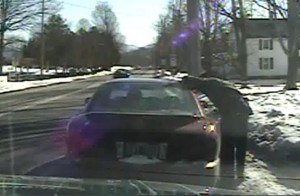ACLU and racial justice allies urge against expanding police power to pretextually stop and search drivers
MONTPELIER—Yesterday the ACLU of Vermont submitted briefing to the Vermont Supreme Court in the racial profiling case Zullo v. State. The case was brought by Gregory Zullo after a 2014 traffic stop and subsequent search of his car by Vermont State Police. Mr. Zullo, an African-American Rutland native, was stopped because snow was allegedly covering the registration sticker on his license plate, which was not a traffic violation at the time.
Five Vermont advocacy organizations joined the National Association of Criminal Defense Lawyers (NACDL) in concurrently filing a “friend of the court” brief in support of Mr. Zullo, citing widespread racial disparities reflected in Vermont police stop data. The groups argue that an expansion in police discretion in this area would make it easier for police to stop and search drivers for pretextual reasons, further infringing on the civil rights of people of color in Vermont.
ACLU of Vermont staff attorney Lia Ernst: “Police officers have wide discretion to conduct vehicle stops, and we have seen that discretion is often infected with implicit or explicit bias. The result of that is clear—people of color in this state are disproportionately targeted for traffic stops and searches. Mr. Zullo’s case demonstrates precisely why stronger constitutional checks on police powers are long overdue.”
Mr. Zullo was pulled over in Wallingford by Vermont State Trooper Lewis Hatch in March of 2014. The officer, citing a faint scent of burnt marijuana, ordered Mr. Zullo out of the vehicle and demanded to search the car. When Mr. Zullo refused, the officer had the car towed to the police barracks to have it searched there. Mr. Zullo was forced to walk several miles in the snow and pay a $150 fee to retrieve his vehicle from the towing company. The search of the car revealed nothing to indicate Mr. Zullo had committed any crime.
The ACLU’s legal brief focuses on two arguments. First, that the Vermont Constitution does not allow officers to rely on a mistaken interpretation of law to justify a vehicle stop. Second, the ACLU argues that exit orders, vehicle seizures, and searches should only be permissible if the police have suspicion of a criminal act, not, as in this case, a civil infraction. When Mr. Zullo was seized, possessing an ounce or under of marijuana was only a civil violation.
ACLU of Vermont staff attorney Jay Diaz: “Police data confirms what people of color in Vermont have been saying for years—racial profiling is an enormous problem in our state. In this case, the Supreme Court has the opportunity to better protect drivers’ civil rights and ensure that police can be held accountable for violating those rights.”
Vermont organizations listed as signatories on the NACDL brief include Justice for All, Migrant Justice, Peace and Justice Center, The Root Social Justice Center, and Vermonters for Criminal Justice Reform. Steffen Gillom, Chair of the Windham County NAACP Organizing Committee and Tabitha Pohl-Moore, President of the Rutland Area NAACP Branch are also signatories on the brief. Vermont’s Office of the Defender General submitted separate briefing in support of Mr. Zullo.
The ACLU of Vermont brief can be accessed here: http://bit.ly/2BW4aEv
The National Association of Criminal Defense Lawyers amicus brief can be accessed here: http://bit.ly/2EZBauq
###
Stay Informed
Sign up to be the first to hear about how to take action.
By completing this form, I agree to receive occasional emails per the terms of the ACLU’s privacy statement.
By completing this form, I agree to receive occasional emails per the terms of the ACLU’s privacy statement.

